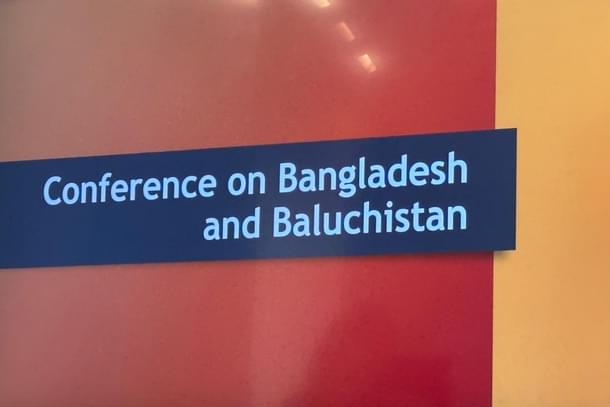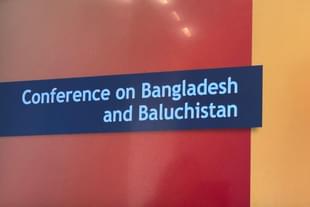Commentary
Westminster Conference Highlights Systemic Persecution Of Minorities In Bangladesh And Baluchistan
Jay Jina
Jun 24, 2025, 06:33 PM | Updated 06:33 PM IST
Save & read from anywhere!
Bookmark stories for easy access on any device or the Swarajya app.


Organised by Dharmic Ideas & Policy Foundation (DIPF), sponsored by Mr Bob Blackman MP, Harrow East, and supported by Chair of the All Party Parliamentary Group (APPG) Freedom of Religious and Belief (FoRB), Mr Richard James Shannon MP, Strangford, along with Ms Julie Jones, Director of the All Party Parliamentary Group (APPG) on International Law, Freedom of Religious and Belief (FoRB), the Conference on Bangladesh and Baluchistan was held at Portcullis House, Westminster, on 9 June 2025.
Mr Bob Blackman MP, who chaired the conference, began by pointing to the long and ongoing plight of minorities in Bangladesh and of the grave situation in Baluchistan, in both of which, in the present political climate, minorities remain in fear for their safety and are exposed to an even greater risk of persecution.
The first speaker, Mr Tathagata Roy, former Governor of the Indian states of Meghalaya and Tripura, former President of the BJP in West Bengal, and author of My People Uprooted: The Exodus of Hindus from East Pakistan and Bangladesh, provided a backdrop to the current plight of Bangladeshi minorities.
Placing this in a historical context, Mr Roy briefly covered events from the earliest times to the colonial bifurcation of Bengal along religious lines, which led to the partition and then the bloody separation from Pakistan and formation of Bangladesh in 1971. He particularly noted the Bengal famine of 1943, the anti-Hindu pogroms of Noakhali in 1946, and the post-independence Pakistani genocides, of which the most prominent occurred in 1950, 1962 and 1971, resulting in millions killed and hundreds of thousands of women raped.
However, unlike the Nazi Holocaust, the mass purges of Stalin, Mao’s Great Leap Forward, the killing fields of Pol Pot’s Cambodia and of Rwanda, of which the perpetrators have all been identified and vilified and many also brought to justice, the ongoing and systemic genocide of Bengali Hindus continues to be ignored.
This Hindu Holocaust, as Mr Roy described it, has not only effectively been written out of history but its perpetrators remain free and feted. The data is stark: in a matter of 75 years from partition, the Hindu population of Bangladesh has been decimated from 29 per cent to only 8 per cent and continues to decline.
Mr Roy pointed to the ideological “othering” of Hindus and other minorities, of the authorities levelling false accusations of religious minorities being Indian “agents” or whose acts have caused offence to the majority religion. Along with a failure of accountability or just a plain dismissal of atrocities, the government and others in positions of authority have continued to enable and sanction violence, rape, pillage, confiscation and burning of property, and the desecration of Hindu sacred symbols and sites, amounting to a direct assault on the indigenous culture and traditions of Bengal.
With very few episodes of respite post-1975, the situation for Bangladeshi minorities continues to worsen. Coercive and discriminatory measures have been applied to systematically squeeze out tens of thousands of minority citizens from government, administrative, and academic positions across the country. Many have fled the country, while those remaining face threats of violence in which abduction and rape are regularly used as instruments for subjugation and cultural genocide of the indigenous Bengalis.
Mr Roy’s account was corroborated by two other speakers, Bangladeshi minorities Mr Samir Das and his daughter, Sudipta Das. Their talk provided additional details of the atrocities. Following them, a member of the audience, himself a recently-arrived lawyer from Bangladesh, spoke of the horrors he and his family have seen and experienced, with minorities being less safe since the regime change of 2024.
Even after having escaped to the UK, he talked about the fear of what may happen to members of his extended family, as well as others from his community who are left behind in Bangladesh. He too remarked on the shocking impact of the dramatic change of population demography and cultural genocide occurring both in Bangladesh and West Bengal.
Ms Francesca Marino, a freelance journalist, security analyst, and researcher specialising in the subcontinent and author of Baluchistan: Bruised, Battered and Bloodied, highlighted the plight of the Baluchi people.
Prior to 1947, Baluchistan was under the rule of the Khanate. On the withdrawal of Britain from the subcontinent, Baluchistan chose to remain independent but Pakistani military action forced an accession. The colonial Pakistani occupation continues to this day, while suppressing Baluchi culture and language. The Pakistani hierarchy exploits its rich natural resources and routinely uses torture as instruments of occupation.
Being co-religionists with the Pakistani-Punjabi elite has proved to be no barrier to the suffering inflicted upon the Baluchi people. Kidnappings, organ robbery, running private prisons for detention, disappearances, and killings are everyday occurrences. Just as in the case of Bangladesh, Ms Marino also highlighted the use of rape as a state instrument for subjugation. She confirmed that a genocide of the Baluchi people is perpetrated by the Pakistani-Punjabi dominated regime.
Dr Gautam Sen, formerly at the London School of Economics and Political Science, who also has roots in West Bengal and Bangladesh, closed the formal part of the conference by highlighting the century-old plight of Hindus and other minorities in the region.
In this, he made the conference aware of a subtle yet important point of civilisational gravitas: traditional, indigenous Indian culture to which all Bengalis originally belong is one that honours womanhood.
Evidence of this is amply illustrated by the Mother or Ma, in the form of the female Deity, Durga Ma, who is much revered in Bengal and across India. The same is so in the defining epics of Indic civilisation, the Ramayana and the Mahabharata, which have at their core narratives that relate the Dharmic duty of society to honour and protect the dignity of woman, who is the embodiment of Shakti: divine strength.
This is in contrast to the malign forces in Bangladesh and Baluchistan who use rape as an instrument of cultural genocide.
In closing, some potential solutions were briefly mentioned, among which the important ones were:
- The application of sanctions and diplomatic pressure on Pakistan and Bangladesh by the UK and other democracies. This should place accountability upon Bangladesh for the full safety of minorities and protection of their religious freedoms.
- For the said democracies to recognise the human rights abuses and support the Baluchi people in their right to independence.
- India to use economic and hydrological sanctions to put pressure on Bangladesh, while also employing powers of the recently passed Citizenship Amendment Act (CAA) to ease the way for displaced minorities to settle and rebuild their lives in India.
Jay Jina is a UK-based third generation NRI. Besides pursuing a professional career as a European IT Director with a multinational and a part time university academic, Jay’s interests span history, current affairs, the Indian Diaspora and the history and politcs of Science.




